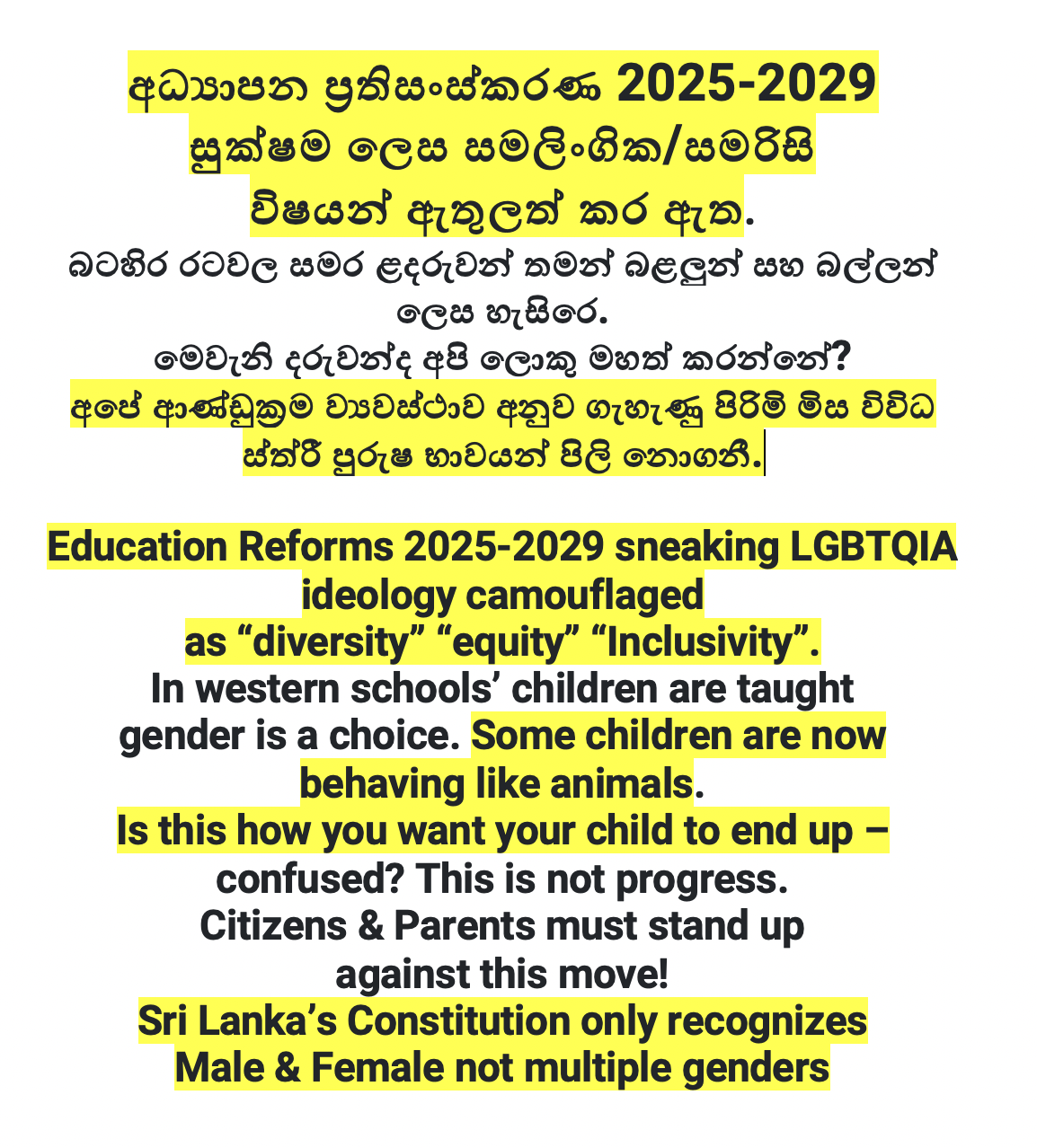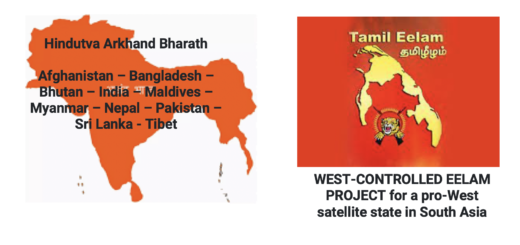The Hidden Agenda: Grade-Level Breakdown Shows How Reforms Erode Nationalism While Introducing Globalist Gender Ideology

Sri Lanka’s New Education Reforms (2025–2029), led by Prime Minister and Education Minister, have sidelined history and Buddhism—pillars of Sri Lanka’s civilizational consciousness—while quietly embedding gender ideology and LGBTQIA+ narratives under the dangerous banners of “equity,” “inclusion,” and “diversity.” These reforms seek to sexualize children at an innocent age, confuse identity, and normalize immorality as progress. There is a deliberate attempt to undermine Sri Lankan nationalism and identity by:
Education Reforms Sri Lanka PPT for 2025.07.11 for Parliament new
There is a deliberate attempt to undermine Sri Lankan nationalism and identity by:
- Removing history and Buddhism as core subjects from the early curriculum, thus severing children’s connection to their ancestral roots, civilizational values, and cultural pride.
- Downplaying Sri Lanka’s unique civilizational heritage, which has sustained the nation for over 2,500 years, especially through the teachings of Buddhism and the historical legacy of Sinhale kings to the achievements of our war heroes.
- Simultaneously introducing globalist concepts of gender ideology and LGBTQIA+ themes—disguised as “transversal” values of equity and inclusion—starting as early as Grade 1.
How this erodes Nationalism and Civilizational Identity
- History and Buddhism Removed from Early Grades
The reforms remove standalone history and Buddhist education from Grades 1–5, a critical period when children form their cultural identity and patriotism. This leaves young learners rootless, lacking exposure to Sri Lanka’s heritage, kingship, Buddhist ethics, and national heroes—making them vulnerable to foreign ideologies.
From Grade 6 onward, history and Buddhism are reintroduced mainly as subjects to memorize and pass exams, without fostering a deep understanding or internalization of their profound cultural and moral teachings.
- Civilizational Heritage Downplayed
By relegating Buddhism and history to optional or elective status in higher grades, the reforms diminish their importance and cultural centrality. This sidelining opens space for fragmented, foreign-originated values that conflict with Sri Lanka’s traditional moral framework.
- Introduction of Globalist Gender and LGBTQIA+ Ideology
Under broad “equity” and “inclusion” mandates—aligned with international Sustainable Development Goals—curriculum modules introduce children to gender diversity and LGBTQIA+ concepts without context or parental consent. These foreign-driven agendas promote individual identity politics over collective national identity.
Grade-Level Breakdown: How Gender Ideology is Strategically embedded while National Identity is systematically dismantled
- Grades 1–5:Through the vague umbrella of “value education,” transversal themes like “equity” and “diversity” are seeded. While the language appears innocent, these are the same gateways globally used to introduce non-binary identity theory and LGBTQIA+ validation. This silent conditioning begins at the most psychologically vulnerable stage of child development, displacing traditional family, religious, and cultural anchors.
- Grades 6–9:Here, “Digital Citizenship” and “Global Studies” explicitly embed UN-framed gender discourse. Students are taught that gender is fluid, morality is subjective, and national values are secondary to global rights—deepening the detachment from Sri Lanka’s ethical heritage.
- Grades 10–13:Through subjects like “Life Skills,” “Health,” and “Human Rights,” students are steered toward Western notions of identity, sexuality, and entitlement. Buddhist restraint and duty-based frameworks are dismissed as outdated. Instead, moral relativism dominates—promoting an identity framework foreign to our cultural DNA.
This staged insertion is not innocent. It follows a calculated path that erases moral boundaries and embeds alternative sexual norms as “modern values,” while suppressing the protective, duty-based ethical system of Buddhism.
Foreign Funding and Global Agendas Fueling the Reforms
Sri Lanka’s reforms align with conditions set by international donors like the World Bank, Foreign Govts, Asian Development Bank, UN agencies, and others, who require:
- Implementation of gender-sensitive, inclusive curricula that incorporate LGBTQIA+ themes.
- Alignment with SDG 4 (Quality Education) and SDG 5 (Gender Equality), which emphasize globalized, rights-based education models.
The Prime Minister and Education Minister have embraced these mandates, prioritizing external funding over national values and parental rights.
The Outcome: Fragmented Identity and Weakened National Cohesion
- Children are disconnected from their historical and spiritual roots at a formative age.
- Traditional Buddhist ethics and social values that once held communities together are replaced with individualistic, relativistic ideologies.
- This paves the way for a weakened sense of nationalism and ability to dissect moral from immoral, right from wrong making the next generation more receptive to globalist narratives and less anchored in Sri Lanka’s civilizational uniqueness.
Consequences of Introducing Gender Ideology in Early Education
Exposing children to complex and highly ideological concepts of gender identity at a tender age has documented psychological consequences in other nations:
- Identity Confusion: When a 6-year-old is told gender is a spectrum and not rooted in biology, the result is not enlightenment—it’s confusion. Children may begin to question whether they are a boy, girl, both, or neither—before they have even developed stable cognitive understanding of the world around them.
- Psychological Instability: In Western schools where such ideologies were rapidly introduced, many children began identifying as transgender, non-binary, or evennon-human “identities” believing they are animals. These are not isolated cases—they reflect a growing trend where social contagion and ideological overexposure erode mental clarity and grounding.
- Social Fragmentation: Children are taught that identity is entirely personal and fluid, undermining shared moral, cultural, and national values. This creates individualism over community, entitlement over duty.
- Medical Harm: In countries like the UK and US, children are being encouraged toward puberty blockers, cross-sex hormones, and even surgeries—with lifelong consequences. While Sri Lanka is not yet at this stage,planting the ideological seeds early paves the way.
If a 10-year-old child is taught that being a boy or girl is optional, don’t be surprised when that same child begins to question reality itself—and ends up identifying as a “cat” or “tree,” as is already happening in schools overseas.
This is not education. This is ideological reprogramming.
A government elected for just five years has no moral or constitutional right to rewrite the civilizational foundation of a 2,500-year-old Buddhist nation. These reforms are not about upgrading schools or modernizing education—they are a direct assault on Sri Lanka’s identity, values, and cultural continuity, handing over our children’s minds to foreign ideological experiments.
What they remove: History, heritage, and the Dhamma that protected this nation.
What they insert: Gender confusion, immorality & sexualization, and blind submission to globalist agendas.
If we allow this curriculum to pass, we are complicit in handing over our children’s minds, our nation’s identity, and our future sovereignty to those who do not share our values or love our land.
This must be stopped. Immediately. Not reformed. Not revised. But Rejected.
Shenali D Waduge







